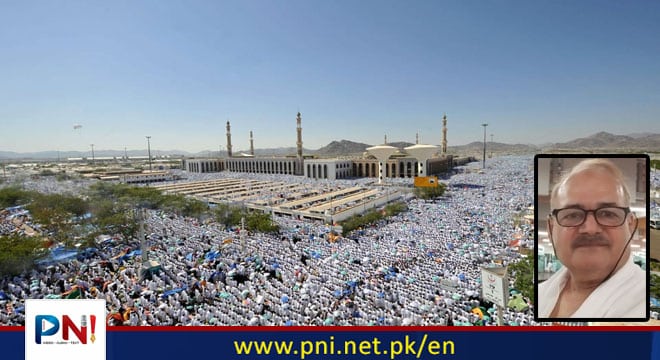The most important part of Hajj, Waqoof-e-Arafat, is being performed today on June 28. Millions of pilgrims from all over the world have reached Arafat. Where Imam Kaaba will deliver the sermon. In the sermon, Imam Kaaba will present the agenda regarding the solution of the problems facing the world of Islam.
This year too, on the invitation of the Custodian of the Two Holy Mosques from the world of Islam, selected guests from different walks of life have been invited to perform Hajj. For this purpose, the Ministry of Religious Affairs of Saudi Arabia has made arrangements in a very good manner.


Let’s see what is the importance of Arafat field in the fifth and most important part of Hajj in Islam.
Waqoof-e-Arafat, also known as the Standing at Arafat, is a vital ritual during the annual Islamic pilgrimage of Hajj. It holds immense significance in the journey of Hajj and carries several impgortant aspects. Here are the key reasons why Waqoof-e-Arafat is important in Hajj:
Fulfillment of Hajj Obligation: The Standing at Arafat is one of the most critical and obligatory rites of Hajj. It takes place on the 9th day of the Islamic month of Dhul-Hijjah, which is known as the Day of Arafat. All Hajj pilgrims are required to gather and spend the entire afternoon from Dhuhr (noon) prayer until sunset in the plain of Arafat. It is an essential pillar of Hajj, and without performing this ritual, the Hajj is considered incomplete.


Spiritual High Point: Waqoof-e-Arafat is considered the spiritual climax of Hajj. It is a time of intense devotion, reflection, and connection with Allah. Pilgrims engage in prayers, recitation of the Quran, supplications, and seeking forgiveness for their sins. It is believed that Allah descends His mercy upon those who stand on the Plain of Arafat and grants forgiveness and blessings.
Repentance and Supplication: Arafat is considered a place of immense mercy and forgiveness. Pilgrims take this opportunity to repent sincerely for their past sins and seek forgiveness from Allah. It is believed that sincere repentance and supplications made during this time have a higher likelihood of being accepted by Allah. Pilgrims pour out their hearts in prayer, seeking guidance, blessings, and mercy.
Reminder of the Day of Judgment: The gathering of millions of Muslims from around the world, standing in unity and humility at Arafat, is seen as a symbolic representation of the Day of Judgment. Muslims believe that this day spent at Arafat serves as a reminder of their ultimate destination and the accountability they will face in the Hereafter. It reinforces the concept of humility, equality, and the transient nature of worldly life.
Prophet Muhammad’s (pbuh) Sermon: Mount Arafat holds historical significance as it is believed to be the location where Prophet Muhammad (peace be upon him) delivered his final sermon during his Farewell Pilgrimage. This adds a profound sense of reverence to the plain of Arafat, making it a place of historical and religious importance.
Overall, Waqoof-e-Arafat is a momentous occasion in the Hajj pilgrimage. It represents a time of intense spirituality, reflection, repentance, and seeking forgiveness. Standing on the Plain of Arafat is considered a pinnacle of the Hajj journey, where pilgrims connect with their Creator, supplicate for their needs, and seek mercy and blessings. It is a deeply profound and transformative experience for those who undertake the pilgrimage.
Follow the PNI Facebook page for the latest news and updates.









